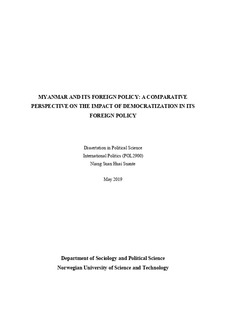| dc.contributor.advisor | Kristian Bernhof Ellinggard | |
| dc.contributor.author | Suante, Niang Suan Huai | |
| dc.date.accessioned | 2019-09-06T14:11:58Z | |
| dc.date.available | 2019-09-06T14:11:58Z | |
| dc.date.issued | 2019 | |
| dc.identifier.uri | http://hdl.handle.net/11250/2613629 | |
| dc.description.abstract | Denne oppgaven er et forsøk på å studere og forstå hvordan demokratiseringsprosessen i Myanmar påvirker sin utenrikspolitikk. Utenrikspolitikken i et land definerer hvordan man forholder seg til andre stater samtidig som man beskytter sin suverenitet og balanserer både de strategiske interesser til eget og andre land. Utenrikspolitikken brukes som en strategi for regjeringer til å lede sin handling på den internasjonale arenaen, og et nydemokratisk land som Myanmar kreves en robust utenrikspolitikk som bygger sine internasjonale relasjoner med andre land. Gjennom dette forsøk av å forklare og forstå endringene i Myanmar utenrikspolitikk etter overgangen til demokrati, er det tydeligvis at landets utenrikspolitikk før-og-etter demokratisering blir undersøkt og diskutert videre i oppgaven.
Oppgaven benyttet en komparativ tidsforskning som vil gi oss muligheten til å fange de essensene av konsekvenser og endringer ved å ta hensyn til tid i den nye demokratisering prosessen og bidra til å forklare endringene eller kontinuitet i Myanmar utenlandske relasjoner i landet som de blir utsatt for til andre eksterne liberale og ikke-liberale aktører over tid.
Videre i oppgaven er det konkludert at det ikke ble gjort store endringer i utenrikspolitikk til Myanmar, men den nye regjeringen forpliktet seg til å streve etter en aktiv utenrikspolitikk ved å integrere seg igjen i det internasjonale samfunnet etter selvisolasjon fra verden for over tiårer. | |
| dc.description.abstract | This thesis is an attempt to study and understand how the democratization process in Myanmar impact its foreign policy. It is apparent that the foreign policy of a country defines how it approach other states while protecting its sovereignty and balancing to maintain both its strategic interests and that of other international actors. Foreign policies are used as a strategy by governments to guide their action in the international arena, thus, a newly democratic country like Myanmar required a robust foreign policy and build its foreign relations with other countries. By attempting to explain and understand the changes made in Myanmar’s foreign policy after its transition to democracy, it is apparent that the country’s foreign policy pre-democracy and after-democracy are looked into and discussed.
This thesis used a comparative temporal research design as it will allow us to capture the essence of consequences and changes by taking time into account in the new democratization process and contribute to explaining the changes or continuities of Myanmar foreign policies in the country as they are exposed to other external liberal and non-liberal actors over time.
Through this thesis, it is understood that no large changes were made in Myanmar foreign policy, however, the new government is committed to pursuing an active foreign policy in re-integrating itself to the international community after self-isolating from the world for over some decades. | |
| dc.language | eng | |
| dc.publisher | NTNU | |
| dc.title | MYANMAR AND ITS FOREIGN POLICY: A COMPARATIVE PERSPECTIVE ON THE IMPACT OF DEMOCRATIZATION IN ITS FOREIGN POLICY | |
| dc.type | Bachelor thesis | |
